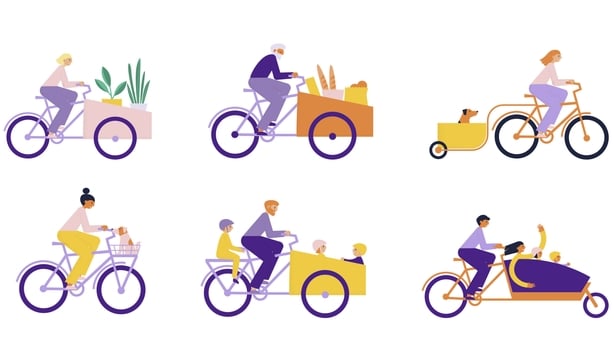[ad_1]
Analysis: A pilot scheme in Dún Laoghaire-Rathdown looked at the factors which might influence the use of e-cargo bikes by small businesses
By Faheem Malik, Northumbria University; Robbie Egan, Connor Dowling and Brian Caulfield, Trinity College Dublin
Cargo bikes have been around for a long time. Historically, they have been used for a variety of activities, such as the delivery of newspapers, post, and food, as well as for street vending. However, with the rise of car use and ownership and the decline of customer delivery as a business practice, cargo bikes became a less prevalent part of everyday business and mobility.
Electrically-assisted cargo bikes might offer particular promise as a motor vehicle substitute, potentially enabling faster, farther, heavier, and easier transport of goods compared to traditional, non-assisted cargo bikes. In studies that have tried to simulate the potential for e-cargo bikes for last-mile urban deliveries, it has been found that e-cargo bikes could act as a substitute for up to 68% of car deliveries based on delivery distance, and 55% of van deliveries based on parcel weight.
We need your consent to load this rte-player contentWe use rte-player to manage extra content that can set cookies on your device and collect data about your activity. Please review their details and accept them to load the content.Manage Preferences
From RTÉ News, report on the e-cargo bike pilot scheme for small business in Dún Laoghaire-Rathdown in 2021
In keeping with the cargo bike trials taking place across many European cities, an e-cargo bike pilot scheme for small business in Dún Laoghaire-Rathdown was implemented from July to November 2021. This pilot was developed collaboratively by Dún Laoghaire-Rathdown County Council, Bleeper, Smart Dún Laoghaire, and Enable and enabled local businesses to access an e-cargo bike at a discounted rate for six months, giving them the opportunity to experiment with e-cargo bikes as a delivery alternative to a car or van.
We analysed data gathered by Bleeper that tracked the movements of e-cargo bikes across 12 participating small businesses who delivered goods ranging from food and flowers to bicycles and motor parts. Our aim was to investigate how factors relating to weather, traffic and the time and date of journeys might influence the use – or ‘mode choice’ – of e-cargo bikes by small business participants, and which factors might be critical.
For trip distance, we discovered that the maximum recorded temperature on a given day (i.e., daily max temp) was by a considerable extent the critical factor influencing the distance of a given e-cargo bike journey. In colder conditions, e-cargo bike journeys were likely to be shorter; in warmer conditions, e-cargo bike journeys were likely to be longer.

Rainfall and the hour in which an e-cargo bike journey is made also had a considerable impact on e-cargo bike trip distance. Journeys appear to be shorter in wetter conditions and in hours of peak traffic. Each of these variables influencing trip distance – daily max temp, rainfall and trip hour – were found to be statistically significant. On this basis, longer e-cargo bike journeys for the 12 businesses analysed appear to be associated with warmer, drier and lower-traffic conditions, while colder, wetter, and higher-traffic conditions seem to deter longer journeys (and potentially more deliveries using this mode).
Looking at the choice of e-cargo bike in wet conditions, we found daily max temperature to be the critical variable by a great extent. In warmer conditions, e-cargo bikes were more likely to be selected despite rainfall; in colder conditions, the combined effects of wet and cold appear to deter the choice of an e-cargo bike for a given delivery trip. Shorter trip durations and more months since the service launch also appeared to favour e-cargo bike use in such conditions.
There could be several explanations for the findings of our study. First, e-cargo bike riders who have the option of using a van or car instead may be poorly equipped for riding in wet and cold weather. They may struggle to keep themselves and their goods dry and warm due to a lack of experience using this delivery mode in varied weather conditions and a lack of access to insulating and waterproofing materials. This lack of experience and/or access to materials could be particularly problematic for longer distance trips.

Second, during wet weather conditions, wet road surfaces might make it more likely that a rider could lose traction while riding a loaded e-cargo bike – particularly among novice users – resulting in less use. Third, cultural beliefs regarding what is ‘normal’ and ‘practical’ transport in particular weather conditions may also play a role, in which cycling is considered an activity only suited to “fair weather” conditions.
On the basis of these possible explanations, measures could be taken to incentivise the use of e-cargo bikes in wetter and colder weather within shared mobility schemes. Improving access to the insulation and waterproofing materials for e-cargo bike riders and for e-cargo bikes themselves to preserve goods could also help expand use in varied weather, along with programmes to equip riders with the ability to do e-cargo bike deliveries in all conditions.
Lastly, efforts to change dominant cultural beliefs around cycling as a predominantly ‘fair weather’ activity that is impractical in wet and cold conditions could be another important area for intervention to expand the acceptability and use of e-cargo bikes as all-weather delivery modes.
This article was based upon a paper Factors influencing e-cargo bike mode choice for small businesses published in Renewable and Sustainable Energy Reviews.
Dr Faheem Malik is a lecturer at Northumbria University. Dr Robbie Egan is a Research Fellow at the Centre for Transport Research at Trinity College Dublin. Dr Connor Dowling is a Research Fellow at the Centre for Business Innovation, at Trinity College Dublin. Dr Brian Caulfield is an Associate Professor in the Department of Civil, Structural and Environmental Engineering at Trinity College Dublin.
The views expressed here are those of the author and do not represent or reflect the views of RTÉ
[ad_2]
Source link
